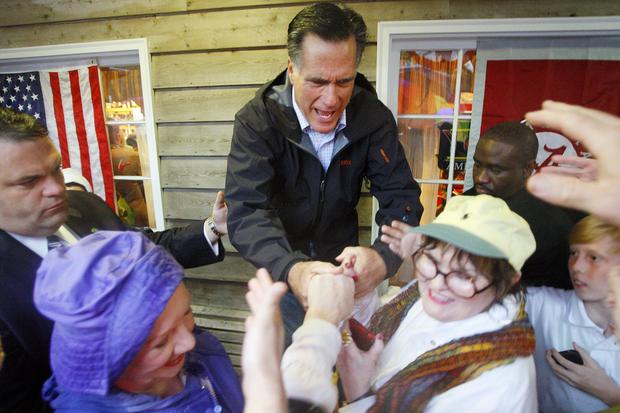In Alabama, Mississippi, Romney hopes to leave his rivals behind
(CBS News) Republican presidential candidate Mitt Romney may not be able to secure the nomination after tonight's Southern primaries, but the candidate is predicting that tonight's results in Alabama and Mississippi will underscore the argument that no other candidate even has a chance.
Polling out of Alabama and Mississippi shows Romney is in a close three-way race in the two states with his two main competitors, Rick Santorum and Newt Gingrich. Hawaii is also holding its caucuses tonight, but the two Southern states hold more significance and the winner could use the results to settle a longstanding argument. A victory in the conservative South would help Romney demonstrate he has the ability to rally his base, help Gingrich demonstrate has lock on the key region, or help Santorum prove he is the authentic conservative and alternative to Romney.
For a once-moderate governor from the northeast, Romney appears to be garnering more support in the South than some may have expected. Polling released Monday by American Research Group showed Romney and Gingrich statistically tied in both Alabama and Mississippi. Winning Tuesday night would give Romney victories in the South, as well as key states in every other quadrant of the country, including Arizona, Michigan, Ohio and Virginia.
Whatever the outcome, the nominating contest is sure to continue. With more than 400 delegates under his belt so far, Romney is far from the 1,144 needed to clinch the nomination. But he is well ahead of his rivals -- Santorum has around 200, Gingrich just under 100 and Ron Paul around 40, according to CBS News estimates. Still, they aren't about to cede the race to the former governor.
Both Gingrich and Santorum are suggesting that while Romney may win the most delegates, his support won't be strong enough to merit winning the nomination before the party's convention in August in Tampa. On the Rick & Bubba morning radio show in Alabama today, Gingrich said he sees an advantage to the "tag-team" approach he and Santorum are taking against Romney.
CBS News Republican delegate scorecard
Complete coverage: Campaign 2012
Real-time pulse: Tracking the GOP candidates on Twitter
"With Rick and me together we are really slowing [Romney] down, with some help, frankly, from Ron Paul," he said. "And I think if you look at - the country is sort of saying, a majority is saying not-Romney. The biggest block is saying Romney, but it's not a big enough block to be a majority. We now are beginning to think he will literally not be able to get the delegates to get the nomination."
Gingrich added that he plans to win a significant portion of delegates in Alabama and Mississippi tonight and to do well in the upcoming Louisiana primary. He said Romney will be at a disadvantage in the second half of the primary season, with states like Texas voting.
Santorum's campaign essentially made the same case in a memo in which Santorum campaign advisor John Yob argues that Santorum could win by rallying conservative support in a brokered convention. While that may be a political reporter's dream, it's more nightmare for the party and has not happened since 1976, when Ronald Reagan failed in his attempt to kick President Gerald Ford off the ticket. The Santorum memo also suggested Romney will do poorly in late-voting states like North Carolina, Indiana and West Virginia.
The former Pennsylvania senator won a key vote of support Tuesday when Alabama Gov. Robert Bentley cast his vote for him.
The Romney campaign has dismissed the Santorum memo's arguments as "pure fantasy."
"Everybody has a scenario where they could become the nominee -- that's fine, but we have a primary process and so far we have two, two and half times as many delegates as [Santorum] has; millions of more votes than he has," Romney said on Fox News on Monday. "That's the nature of the political process. If he is able to pull off a miracle, then so be it."
In a memo Tuesday morning, Romney campaign spokesperson Andrea Saul summed up the day as "yet another day that our opponents will be unable to make up the ground needed to get to 1,144 delegates."
The campaign acknowledged that Romney will split the delegates from Alabama and Mississippi with his two main rivals, since the delegates are awarded proportionally. But while that slows down Romney's march to 1,144, it makes it nearly impossible for the other candidates to catch up to him. All but four of the states that have yet to vote award their delegates proportionally.
The Santorum campaign has argued that if Gingrich would exit the race, Santorum would emerge as the clear conservative alternative to Romney. Certainly, if Gingrich fails to impress in Alabama and Mississippi, it could mean the end of his campaign. However, the Romney campaign today argued that winnowing down the field would only leave more delegates on the table, enabling Romney to get to 1,144 faster.
The candidates' plans indicate that they're already looking past Tuesday night's results: Romney is taping a series of interviews today in Missouri, where Republican voters will make their pick on Saturday. Santorum is hosting an election night party in Louisiana, where voters weigh in on March 24. Gingrich has plans to head to Illinois on Wednesday, ahead of the March 20 primary.
With reporting from CBS News/ National Journal reporter Sarah Huisenga

